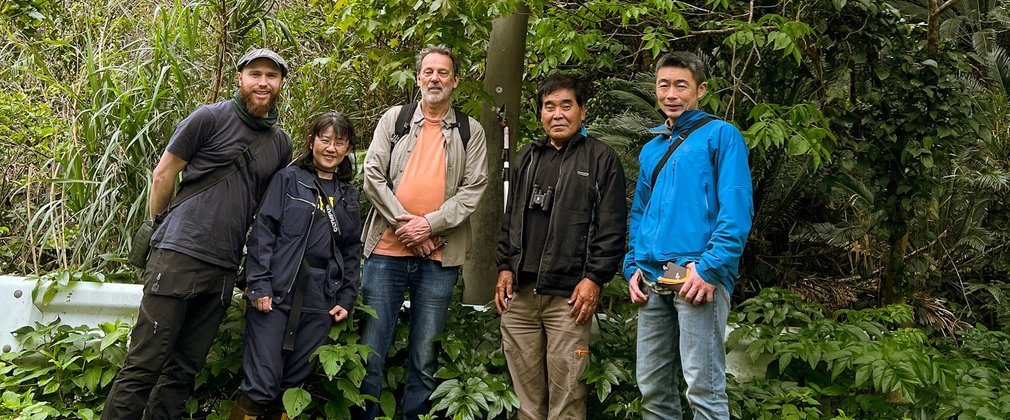
In March 2024, experts from Westonbirt Arboretum, in partnership with the University of British Columbia, Tsukuba University and Botanical Gardens Conservation International (BGCI), embarked on a landmark expedition, timed to coincide with flowering of this Critically Endangered species, to survey the wild population of the endangered Amami maples nestled on Amami-Oshihma, a tiny island in southern Japan.
This team of Japanese, Canadian and UK Acer researchers have, for the first time, undertaken a comprehensive population survey of the world’s rarest maple, Acer amamiense.
Only 12 mature trees were found remaining in the wild during this survey. Despite their limited numbers, this discovery does fuel optimism for conserving what is the world’s most threatened maple.
Although earlier reports claimed that the population comprised only male trees, three reproductively mature females and numerous seedlings representing several age classes were also observed. The maple’s present distribution is limited to an area less than one hectare in size, and though the entire population is still dangerously small, there is regeneration and the trees appear to be in good health.
Pictured (left to right): Dan Crowley, Ikuyo Saeki, Douglas Justice, Mr. Takashi, (expedition Guide, Ryo Sugiyama (Curator at the Nitobe Memorial Garden at the University of British Columbia)

Dan Crowley, Tree Conservation Manager based at Westonbirt, whose role is funded by charity The Friends of Westonbirt Arboretum, and a key member of the BGCI ‘Global Conservation Consortium for Acer’ said:
“While we were pleased to find that the wild status of Acer amamiense is better than first feared, the species is still very much on the edge, in more ways than one. Given its perilous state, it is vitally important that botanic gardens work to back up this special tree in our collections. Our plants act as insurance and allow us to better understand how to conserve them into the future. Our journey to the Japanese island of Amami-Oshihma was delayed due to severe weather events, bringing home the imminent threat from climate change faced by these trees - a single tsunami could wipe out the entire wild population. There are more Amami maples in gardens across the south of England than there are in the wild! Collections of endangered and threatened species in botanical gardens like Westonbirt Arboretum are a place where plants can be safeguarded.
We’re hoping that seeds from the wild Amami maple can be sent to the UK for propagation and to secure its future we’d like to see a genetically diverse collection of Amami maples planted at places like Westonbirt Arboretum and botanic collections across the globe”.
Douglas Justice, Associate Director, University of British Columbia commented:
“As we saw on Amami, maple populations are often isolated and sometimes exceptionally small. This is a particular concern in temperate mountain habitats in some developing countries, where habitat loss due to development and climate change continues to go unchecked. The result is that one in five maple species is now threatened with extinction. It’s worth considering that on Amami, one typhoon could potentially take out the mountainside that is home to A. amamiense. Maples are familiar trees—especially so in Canada—but because maples are common across much of the developed North, we might just take them for granted. We can’t let that familiarity make us complacent about the survival of maples in more vulnerable parts of the world.”
Ikuyo Saeki, Tsukuba University, Japan, said:
"It is my pleasure that Acer amamiense, an endangered endemic maple in Japan, was studied as the international collaborative project, and we unexpectedly found many regenerating trees. That is definitely an exciting finding. I hope our team will be able to obtain more information about reproduction, genetic diversity, and vegetation of the site, and keep communicating with local people and governmental organizations for future conservation."

Since their initial discovery in 1999, the Amami maples have existed without monitoring or records of their natural distribution. This survey was the first concerted effort to assess their status, revealing the reality of a species on the brink of extinction. Notably, the discovery of three female specimens among the population offers hope for the species' reproductive future.
The expedition to Japan was instigated by the Botanic Gardens Conservation International (BGCI) Global Conservation Consortium for Acer (maples), a group of experts from botanical gardens working together to address the conservation needs of highly threatened maple species. The information gathered on the expedition will inform the conservation of the species in situ and updated IUCN Red List assessment.
Globally, one in five maple species (36 species) are at high risk of extinction in the near future and need conservation action. The survival of the Amami maples faces numerous threats, including urban development, agriculture and timber harvesting, compounded by the challenges posed by climate change.
There are five Amami maples within Westonbirt Arboretum’s collection of 2,500 species of trees, alongside a national collection of hundreds of different types of maple tree. The Amami maple usually flowers in May and has beautifully shaped leaves and stunning red seasonal colour.
As we gear up to work with experts across the globe to secure the future of the Amami maple, we draw on experience from another recent international collaboration to plant genetically diverse collections of critically endangered Wollemi pine trees at various places across the globe including Westonbirt and Bedgebury Pinetum.
As the global tree conservation community unites its expertise and resources, there remains hope that the Amami maple can be saved from extinction.
We are very grateful to the Friends of Westonbirt Arboretum for their continued support for our tree conservation work. Many thanks too to the Japanese Pro Natura Fund for supporting our involvement in this vital work on threatened Japanese maple species.
